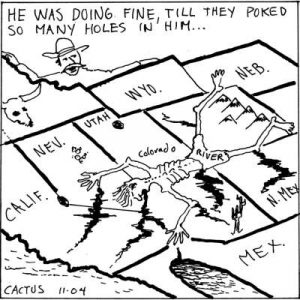Brief by Central Staff
Modern Life – November 2004 – Colorado Central Magazine
In Salida and certain other parts of Central Colorado, some of us like to joke that we have a constitutional right to a siesta.
The logic behind that is a bit convoluted. It starts with Article VI of the U.S. Constitution, which states that “The Constitution … and all Treaties made … shall be the supreme Law of the Land.”
So treaties have constitutional power, and the 1848 Treaty of Guadalupe Hidalgo, made after the Mexican War, promised to respect certain rights and customs in what had been Mexican Territory — such as the land on the south or west side of the Arkansas River.
Although the treaty isn’t specific in this matter, it seems obvious that the afternoon nap was a local custom in this land that had belonged to Spain before Mexican independence in 1822 and Mexico until 1848.
But it appears that the siesta might be dying in its birthplace, according to a Wall Street Journal story on Sept. 22.
Traditionally, residents of Madrid went to work early, then went home at noon for lunch and a long nap, returned to work in late afternoon, worked into the evening, and dined late, rarely going to bed before midnight.
However, in recent years, “Spain’s economy has taken off. Prosperity, globalization, and European Union membership have forced many urban Spaniards to adopt the habits — at least the short lunch breaks — of northern Europeans. A real-estate boom has spawned vast suburbs, making it impossible for many workers to go home in the middle of the day. One casualty of these changes is the siesta, the traditional after-lunch nap that has long been a central feature of Spanish life.”
The siesta makes plenty of sense in an agricultural zone where the sun shines hard during the heat of the day; outdoor farm work is less brutal in the cool times of morning and evening.
And hey, we like the siesta here at Central World Headquarters, too, where there’s mostly indoor work with no heavy lifting. But with the siesta fading in its birthplace of Spain — the Madrid city government wants to put its workers on a 9-5 schedule — we might have to come up with another excuse, rather than claiming that we’re exercising a rather convoluted constitutional right.



